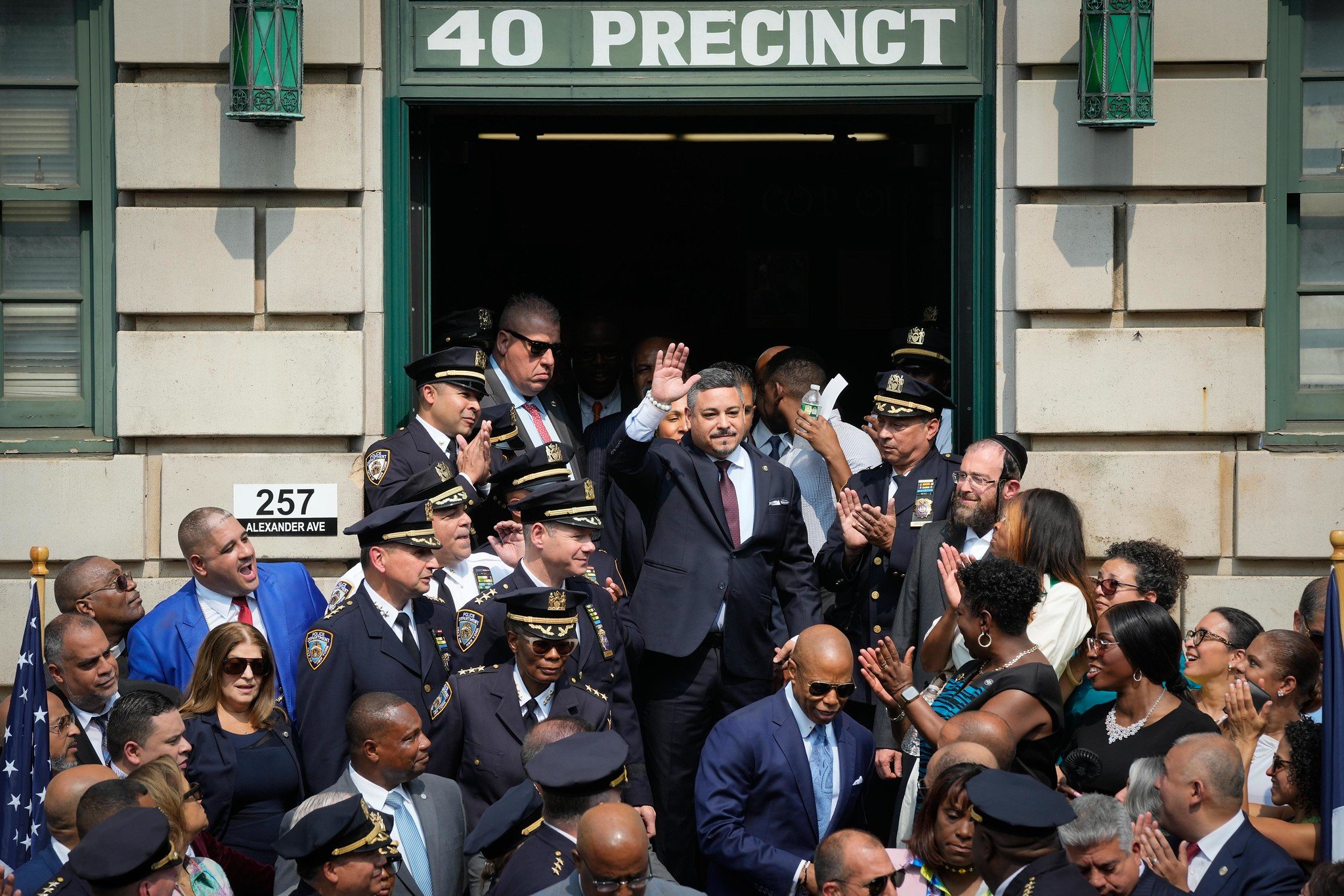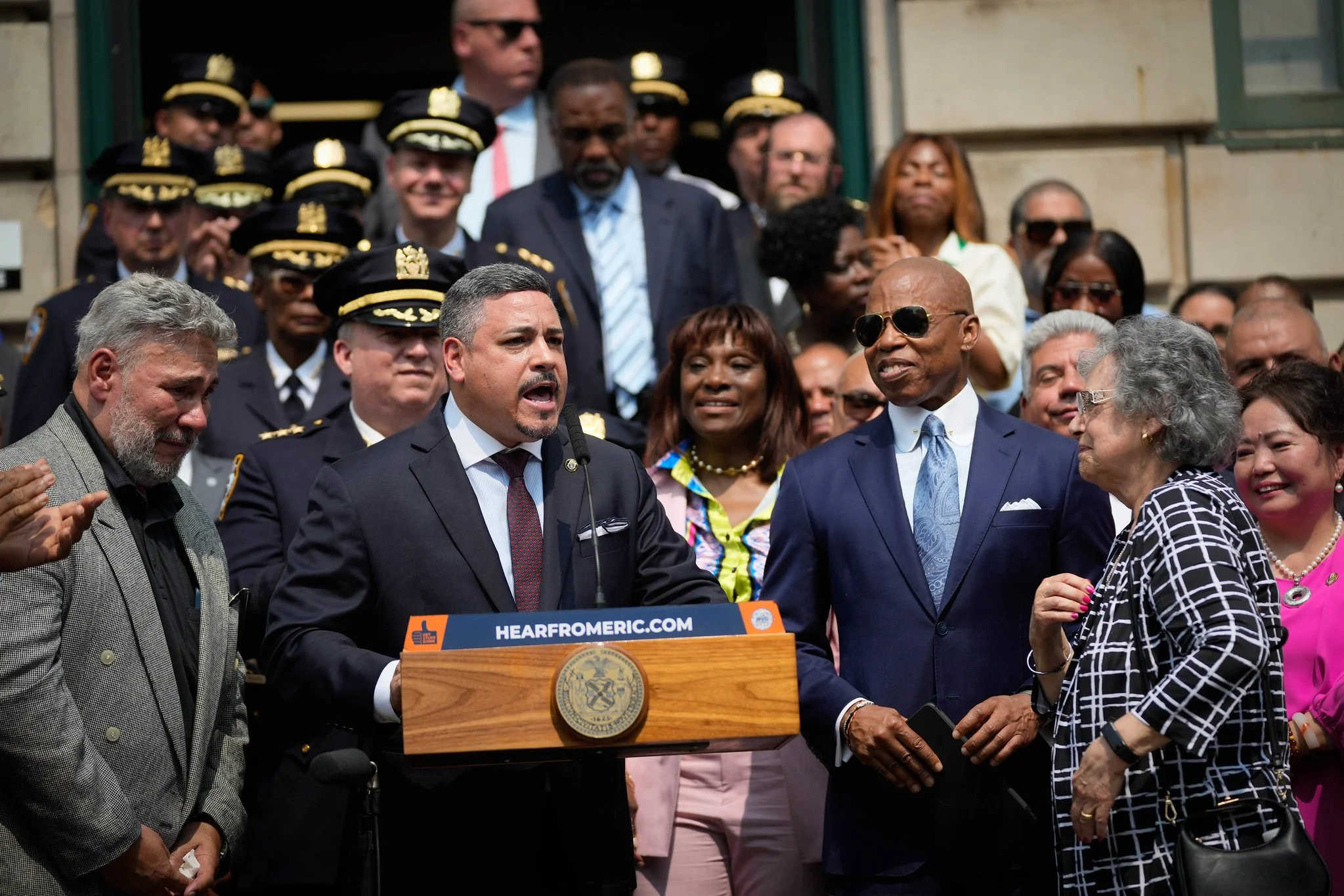Mayor names Edward Caban next police commissioner
/Edward Caban was appointed as the first Latino NYPD commissioner on Monday, July 17, 2023.Photo by Michael Appleton/Mayoral Photography Office
By Ryan Schwach
Edward Caban became the first Latino to lead the New York City Police Department as commissioner on Monday, taking control of the department as crime rates are on the decline but as the public’s image of crime and safety in the five boroughs and of the police department remains tenuous.
Caban is stepping up after briefly serving as acting commissioner following the resignation of former Commissioner Keechant Sewell in June.
The new commissioner is the son of a retired transit police officer who was raised in the Bronx. He began his career at the 40th Precinct in the South Bronx, where he was formally introduced to fanfare on Monday.
He called his new role the “honor and privilege of a lifetime.”
“My journey with the NYPD began over 32-years-ago, a young Puerto Rican kid from Parkchester standing on a foot post in the South Bronx,” Caban said. “In those days, the top bosses of the police department didn't really look like me. Police Officer Eddie Caban could not walk into the 40th Precinct and look up at the leadership photos hanging on the wall and envision his future.”
Caban spent much of his career in the Bronx, as well as more recently in Brooklyn before ascending to more executive roles.
His father, Juan Caban, was a detective in the transit bureau and president of the Transit Police Hispanic Society during his time in the police department.
Mayor Eric Adams, once a transit cop himself, said that Juan Caban worked to make improvements in the diversity of the NYPD’s ranks.
“Little did he know one of the improvements he was going to make is to allow his son to become a police officer and now become the top police officer in the most important city on the globe,” Adams said.
Adams spoke highly of his new commissioner.
“He's the right choice for right now,” he said. “He has been instrumental in the department's efforts getting crime down over the last 18 months.”
“This is a hard job, it's a difficult job – today you applaud him, but the love affair only lasts a few days,” he added.
Sewell, Adams’ first NYPD commissioner, resigned in June amid a reportedly fractured relationship with the mayor and the Deputy Mayor for Public Safety Philip Banks.
Sewell was allegedly regularly undermined by Adams and Banks. It was also reported that Sewell faced pushback from City Hall when attempting to discipline Chief of Department Jeffrey Maddrey, who had voided an arrest of a retired officer in Brooklyn who had chased several teens and threatened them with a gun.
However, on Monday the mayor applauded Sewell and her work in bringing crime down in the city.
“I cannot thank Commissioner Sewell for her service and 18 months of turning around the city – so yes, [Caban] has a tough act to follow,” Adams said. “The return of the greatness of this city is due to the partnership with Keechant Sewell and our incoming-Police Commissioner Edward Caban.
Caban also recognized his predecessor, saying Sewell served with “great confidence and honor.”
Edward Caban, born and raised in the Bronx, was appointed by Mayor Eric Adams to serve as the NYPD’s next commissioner on Monday, July 17, 2023.Photo by Michael Appleton/Mayoral Photography Office
“She brought down crime and we are standing on that great foundation,” he said.
Much of the morning’s introduction highlighted diversity, and the historical lack of diversity in the NYPD’s executive ranks.
“When you look at the department, you don't see youthfulness, you don't see the diversity at the top,” Adams said. “The NYPD has a great crime fighting profile, but it has an image problem.”
Adams also appointed Chief Tania Kinsella – who has spent most of her career in her native Staten Island – as the first woman of color to serve as deputy commissioner, taking the role Caban vacated upon his promotion to commissioner.
“Her poise and character, her ability to lead from the front with a level of dignity and caring was just unparalleled,” Adams said.
Many officials, including a number from Queens, supported Caban’s appointment on Monday.
“Congrats on your historic appointment,” Queen Borough President Donovan Richards said on social media. “I look forward to the work ahead with you to strengthen the relationship between the department and communities across Queens.”
But in addition to the support, Caban’s appointment was met with skepticism, especially from those who believe his lengthy career with the NYPD could impede any efforts to reform it.
“Policing in New York City is in dire need of reform, and Mr. Caban has to make significant inroads with the public to improve their trust in the department he’s about to lead,” the Legal Aid Society said in a statement. “This starts with acknowledging that law enforcement isn’t a panacea for many community issues and that initiatives like the evidence-based CURE Violence model must take precedence over the continued revamping of the racist and fraught policies and practices of yesteryear.”
“Secondly, the culture of impunity at both 1 Police Plaza and precincts throughout New York City will only continue to metastasize should Mr. Caban fail to meaningfully address rampant misconduct, and this crisis should also rank high on his priority list,” Legal Aid added, imploring Caban to meet with community members as soon as possible.





